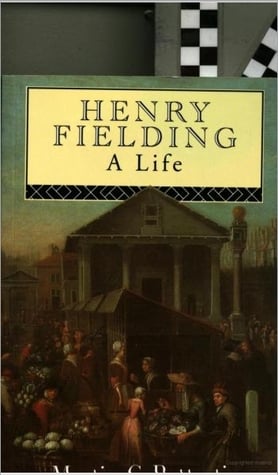Walter Scott, in 1820, wrote that Fielding is “father of the English Novel.” Yet James Russell Lowell, in 1881, remarked to an English audience that “We really know almost as little of Fielding’s life as of Shakespeare’s.” Lives of Fielding, or important essays about him, have been written by distinguished men of letters—Arthur Murphy, Walter Scott, James Russell Lowell, Austin Dobson, Leslie Stephen, Wilbur Cross, and others—but no thorough biography had existed before this big new book came from the press.
Professor Battestin and his wife have discovered a good many Fielding letters previously unknown, 41 political satires previously unattributed to him, and abundant materials in the Old Bailey Sessions Papers and various London archives. We still do not know everything about Fielding; but it seems probable that this Battestin Life, so carefully prepared, will remain the principal study of one of the most lively writers in the English language. Battestin published 15 years ago The Moral Basis of Fielding’s Art, a major study; he is the undisputed chief authority on Fielding’s writings and his life.
It will not do to judge this book by the publicity hand-out sent to reviewers and booksellers by the publisher. This blurb instructs us that Tom Jones “shocked the delicate minded members of English society when it was first published in 1749. In fact many believed that the book, with its lusty hero, was responsible for the two earthquakes which rocked London shortly after its publication.” This is rubbish. There were no London earthquakes (!); and as for shocking the English public at the middle of the 18th century, a sentence from Lowell will suffice here: “We must guard against falling into the anachronism of forgetting the coarseness of the age into which he [Fielding] was born, and whose atmosphere he breathed.” Fielding and Smollett shocked nobody much.
Worse follows. The writer for Routledge’s “book news” endeavors to make much of alleged possible incest. “There is also evidence to hint at possible unorthodox behavior with his sister Sarah, who in fact moved in with Fielding after the death of his first wife.” How shocking, that a sister (also a novelist, incidentally) should keep house for her brother! Actually, Battestin touches only briefly on such conjectures, although he appears to have been tempted to turn psycho-biographer at two or three other points.
For antidote to such nasty speculations, one may turn to the pages of Sir Leslie Stephen, in 1899:
Fielding’s critics and biographers have dwelt far too exclusively upon the uglier side of his Bohemian life. They have presented him as yielding to all the temptations which can mislead keen powers of enjoyment, when the purse is one day at the lowest ebb, and the next overflowing with the profits of some lucky hit at the theatre. . . . But it is essential to remember that the history of the Fielding of later years, of the Fielding to whom we owe the novels, is the record of a manful and persistent struggle to escape from the mire of Grub Street. . . . He was manly to the last, not in the sense in which man means animal; but with the manliness of one who struggles bravely to redeem early errors, and who knows the value of independence, purity, and domestic affection.
And it is thus, indeed, that Battestin perceives Fielding. This new life gives the quietus to diverse silly anecdotes and legends about Fielding—among them Horace Walpole’s picturesque but malicious report that when justice of the peace for Westminster and Middlesex, Fielding was found dining at his house with “a blind man, a whore, and three Irishmen.” In truth, the blind man was Sir John Fielding, Henry Fielding’s half-brother and his successor as “court justice” in Westminster; and the alleged “whore” was the second Mrs. Henry Fielding.
Part IV of this book, “Magistrate and reformer,” I find particularly interesting. Fielding’s campaign against robbers and thieves, which effort brought about the final ruin of his health, may remind readers of the streets of New York, Washington, or Detroit nowadays. Fielding succeeded in catching “a gang of twenty armed pickpockets,” all of them Irish and all discharged sailors, who called themselves “The Royal Family”; and also in convicting “Terrible Nick” or “Nick the King of Glory” and his band.
The publisher’s blurb calls Fielding a “public defender”—as if he had headed some 18th-century Legal Aid bureau. In truth, his vigorous putting down of riotous mobs became highly unpopular. Battestin makes this clear:
The century in which he lived was moving toward revolutions in both the Old and New Worlds that ushered in republican and democratic forms of government; but Fielding, like the vast majority of his contemporaries, distrusted such systems. He scorned ‘the Mob’—’the fourth Estate,’ as he called them sarcastically. He would have regarded those epoch-making events with horror, as cataclysms very like the triumph of Anarchy that Pope envisaged in the Dunciad. . . . Far from being the forward-looking prophet of libertarianism he sometimes is said to be. Fielding was profoundly conservative as a social thinker.
Tom Jones, said Edward Gibbon, “will outlast the palace of the Escurial, and the imperial eagle of the house of Austria.” The Escurial was not tumbledown, when last I saw it, and the great family of Habsburg is vigorous still, though dethroned. Moreover, this reviewer adheres more to the Scott school of the novel than to the Fielding school. Nevertheless, Tom Jones will not fall into the obscurity that long ago overtook Fielding’s plays; nor will Fielding the man be forgotten, rant though Deconstructionists may.
[Henry Fielding: A Life, by Martin C. Battestin with Ruthe R. Battestin (London and New York: Routledge) 738 pp., $45.00]

Leave a Reply